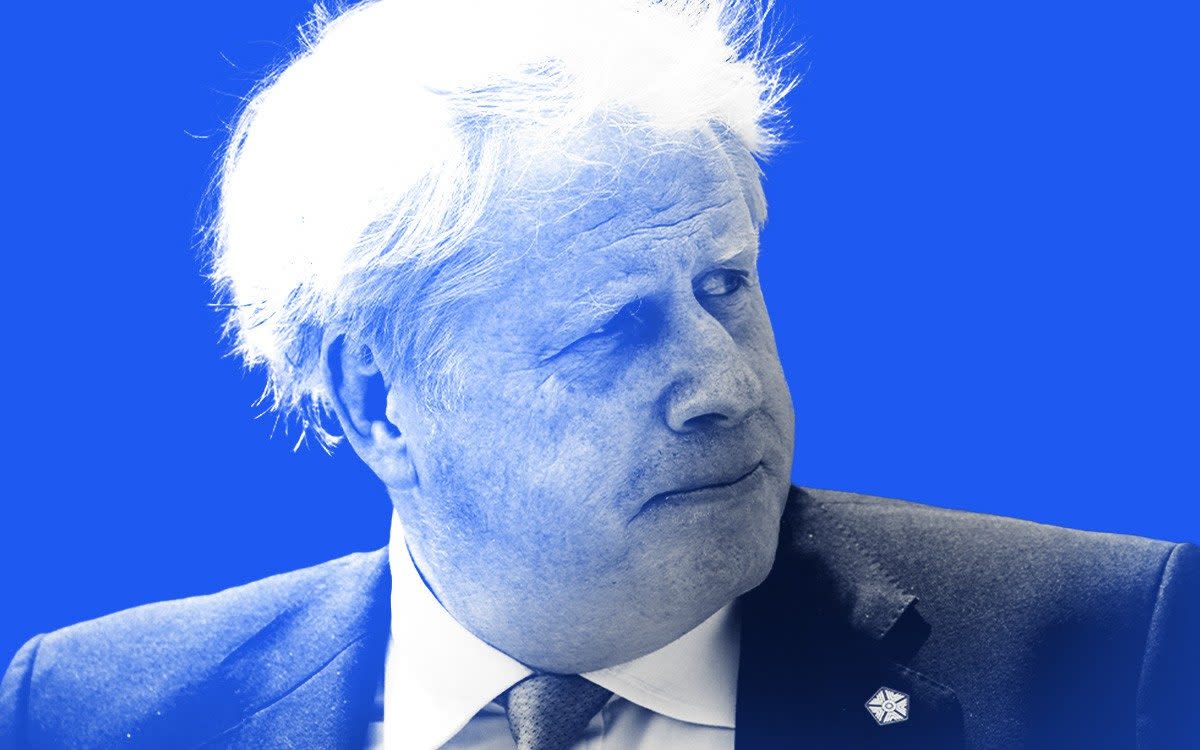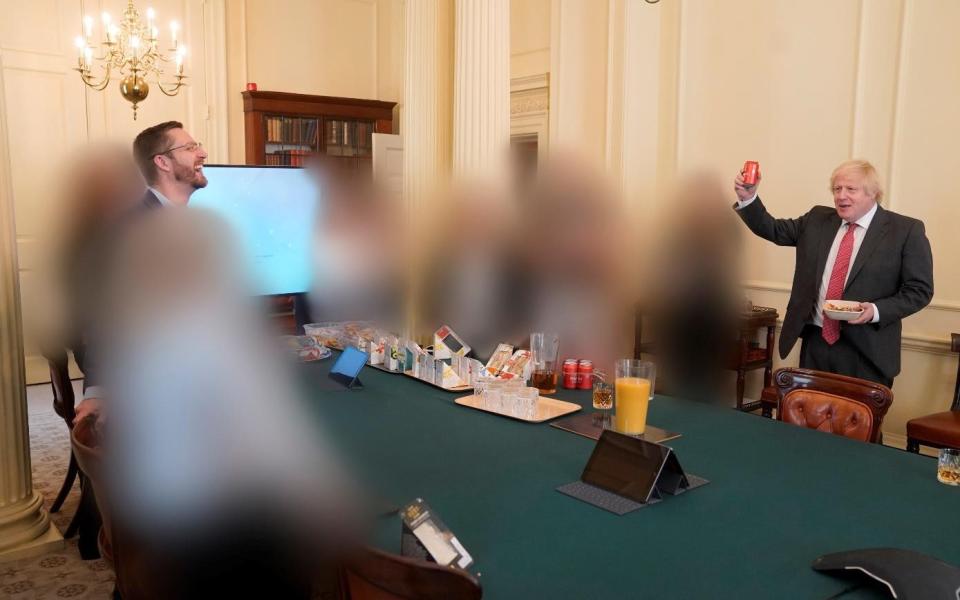'Weaponised' photographs and 'selective' evidence: 13 key points as Boris Johnson defends partygate

Boris Johnson's evidence to the privileges committee has been published ahead of his four-hour partygate grilling by MPs on Wednesday afternoon.
In the balance is whether Mr Johnson knowingly and deliberately misled MPs about lockdown-breaking parties in Downing Street when he insisted no Covid rules were broken.
The 52-page document has been described by the former Prime Minister’s allies as his “bombshell defence dossier”. Here are the key points.
1. I did not 'intentionally or recklessly' mislead Parliament
Mr Johnson begins by saying he takes “full responsibility” for everything that took place on his watch at Downing Street.
He says it is “of course true” that his statements in the House of Commons - that the Covid rules and guidance had been followed at all times - turned out not to be correct.
And he adds that as soon as the Sue Gray inquiry and the Metropolitan Police investigation concluded, he corrected the record.
But Mr Johnson insists that he did not “intentionally or recklessly mislead the House” and “would never have dreamed of doing so”.
2. Not a 'single document' shows I am guilty
Mr Johnson insists there is “no evidence at all” to support the allegation that he intentionally or recklessly misled the House.
And he adds that there is “not a single document” that indicates he was in any way warned or advised that he might have broken Covid rules.
3. Dominic Cummings should not be believed
Mr Johnson says the only exception to this is the “discredited” Dominic Cummings, his former Downing Street aide.
However, the former Prime Minister points out that the claims from Mr Cummings are “not supported by any documentation”.
4. It was not 'obvious' rules were broken
Mr Johnson then addresses the claim that it should have been “obvious” to him that Covid rules were not followed, because he attended some gatherings himself.
But he argues that this allegation is “illogical” because it also “extends to many others” who were also present at the various events in question - none of whom believed they had done anything wrong.
“If it was ‘obvious’ to me that the rules and guidance were not being followed, it would have been equally obvious to dozens of others who also attended the gatherings I did,” he argues.
“The vast majority of individuals who have given evidence to the committee and the Cabinet Office investigation have not indicated that they considered that their attendance at the events contravened the rules or the guidance.”
5. Photographs of parties 'weaponised'
Mr Johnson says the committee has relied on photographs of events at which he was present, to build a case against him.
But he claims these pictures have been “weaponised” and adds that four out of five were taken by the official No. 10 photographer.
“A suggestion that we would have held events which were “obviously” contrary to the Rules and Guidance, and allowed those events to be immortalised by the official photographer is implausible,” the defence document says.
6. 'Absurd' to suggest I should have ignored advice
Mr Johnson also hits back at the suggestion that it was “in some way reckless” for him to rely on assurances he received from Downing Street aides that Covid rules had not been broken.
“The Committee also now appears to be alleging that it was in some way reckless for me to rely on assurances that I received from trusted advisers,” he says. “That allegation is unprecedented and absurd.”
The former prime minister points out that he was trying to run the country and manage the Government’s response to the pandemic and it “self-evidently reasonable” for him to rely on the advice of his aides.
He says that if ministers cannot rely on the advice of their officials, this would have “profound and debilitating implications for the future of debate in the house, and for the ability of ministers to rely on the advice of their officials when answering questions in Parliament”.
7. The privileges committee inquiry is 'unfair'
Mr Johnson goes on to dispute the committee’s claim that “we have done all we can to ensure the fairness of our process”.
He says the committee has gone “significantly” beyond its terms of reference and chose to “unilaterally expand its mandate” which is “obviously inappropriate, impermissible and unfair”.
The defence document explains that while the inquiry initially set out to examine whether any Covid guidance had been broken, it later said it would also look at regulations.
The committee also introduced the “entirely new” charge that he “recklessly” misled parliament which he says “lacks any principled foundation”.
8. The privileges committee is prejudiced against me
Mr Johnson notes that the committee adopted a “highly partisan tone” when it claimed that there is evidence that “strongly suggests” that rule-breaking took place in Downing Street and that this should have been “obvious”.
He says they reached this conclusion “despite the fact that the committee has not yet heard any evidence from me”.
He also claims that the committee has been “extremely selective” in the evidence it has cited against him and says they failed to identify a “single document” that suggests he was told gatherings run contrary to Covid guidance.
9. Covid rules were complex - and there was a workplace exemption
Mr Johnson goes on to explain that the Covid rules were “extremely complex” and highlights the exception which said a gathering was allowed as long as it was “reasonably necessary” for work purposes.
He says that he believed those working in Downing Street and the Cabinet Office during the pandemic were “lawfully gathered” at their place of work.
And he adds that everyone else shared this assumption, including “all of the witnesses who have given evidence to the committee”.
10. Staff went to 'great lengths' to follow guidance
Mr Johnson describes how those working in Downing Street during the pandemic were “on the front line of the Government’s fight against Covid-19” and were working “together around the clock”.
He hit back at the idea that No 10 officials considered themselves to be in a “guidance-free bubble” where the rules of the country did not apply, adding “nothing could be further from the truth”.
He says that "conspicuous steps" were taken to limit the spread of the disease, but points out that Downing Street is an “old, cramped London townhouse with many bottlenecks and many small rooms”.
While officials did their best to “give each other as wide a berth as possible”, some people “inevitably” came closer to each other as proximity was “sometimes unavoidable”. But this was acceptable under the guidance, he adds.
11. I honestly believed the events I attended were “lawful gatherings”
Mr Johnson says that when he spoke in Parliament about lockdown gatherings in Downing Street in early December 20221, he did not believe events were in breach of Covid rules or guidance.
He adds that at the time, he was unaware that events had “escalated” beyond what was lawful after he had left. And he says that at that time, he was not even aware of the existence of further gatherings which Sue Gray and Scotland Yard went on to investigate.
12. Rishi Sunak does not understand why he was fined
Mr Johnson notes that both he and the current Prime Minister, Rishi Sunak, were issued with fixed penalty notices for an event on June 19, 2020.
He highlights that he knew “nothing” about this event - which took place on his birthday - in advance.

And he adds that “to this day it remains unclear to me – and I believe the Prime Minister may feel the same – how precisely we committed an offence under the regulations”.
Mr Johnson says he has never been provided with an explanation by the police about why he was fined while some others present at this event were not.
13. No cake was eaten and Happy Birthday was not sung
The defence firmly puts to bed the idea that cake was eaten at the event and that Happy Birthday was sung.
Mr Johnson says those present “had a sandwich lunch together” and colleagues wished him Happy Birthday.
“I was not told in advance that this would happen,” he says. “No cake was eaten, and no-one even sang happy birthday’. The primary topic of conversation was the response to Covid-19.”

 Yahoo News
Yahoo News 
